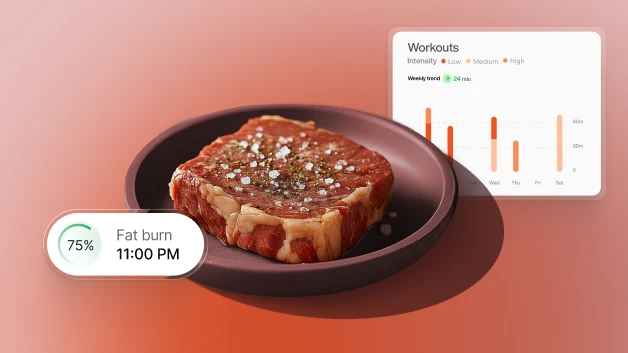Healthy eating habits for optimal nutrition

We all know a healthy nutrition is key for a healthier and more energetic lifestyle.
But actually, the very maintenance of our healthy nutrition habits is what makes it a sustainable part of our lives. This has a crucial effect on our metabolic health and our body's ability to use food as an energy source.
While "old habits die hard," many of us have spent years developing unhealthy eating habits, and it can be difficult to break those patterns. Whether it's reaching for junk food when we're stressed or skipping workouts when we're busy, these habits can be deeply ingrained and hard to change.
When we want to make healthy changes, we must change how we do things. Most of the time, a healthy lifestyle starts with our eating habits. But we can see it's not that easy, according to Statista, where 59% of US adults do not follow any nutrition rules.

The solution is optimizing your metabolism and using a nutritional macro plan personalized to your physiology to guide your day. Improving your metabolic flexibility through nutrition has many health benefits.
In this four-part series, we’ll share our favorite tips for developing healthy eating habits - straight from Lumen’s metabolic health experts and nutritionists.
Food Habits and Metabolic Health
Your food provides your body with all the raw materials needed to produce energy, create new cells and tissues, manufacture hormones, heal and repair itself.
In turn, this feeds into your metabolic health (pun intended), which is essential to your overall health. By getting to know your metabolism, you’ll better understand the personalized nutrition your body wants and needs.

When it comes to reaching your health goals - whether it be losing weight, enhancing fitness or increasing your energy levels, understanding how your metabolism plays into it will reveal the inner workings of your body.
While it's easy to feel discouraged and lose steam, the trick is turning those big, intimidating goals into smaller, manageable steps. Breaking the steps down and tracking your progress weekly or monthly will show you your progress, and you'll also feel inspired and motivated to keep going!
There are three key factors to consider when it comes to food and metabolism:
- Food quality, or what you eat
- Portion sizes, or how much you eat
- Meal timing, or when and how often you eat
Keep reading to learn healthy eating habits around these factors and achieve your goals.
Food Quality
When it comes to metabolism, macros matter. Macros, or macronutrients, are the three nutrients that provide calories: fat, protein, and carbs. (For example, alcohol also provides calories, but it’s not a nutrient.)
Depending on your current health status, how active you are, and several other factors, the balance of macros that’s best for your body can vary greatly. And, even in an individual, the best macro balance can change from day to day.
For instance, you may need to consume extra carbs on a really active day to give you the fast-acting energy your body requires, but on a less active day you may need fewer carbs.
Additionally, it’s really important to consider the kinds of foods you’re eating. Real, whole foods in the right portions and personalized according to your physiology, is made up of ample protein, healthy fats, and healthy carbs in moderation.
This approach to nutrition promotes stable blood glucose levels. Stable blood glucose means less carb snacking, as there are no sharp drops of blood sugars.
Less carb snacking allows the body to tap the body’s fat reserves for fuel, which can help get you closer to your health goals.
Cooking more meals at home is a great healthy habit that will help you dial in the quality of your meals.

Portion Sizes
Portion sizes are an often-overlooked aspect of maintaining good metabolic health. Consuming the right balance of macronutrients is important, but paying attention to how much food you're eating is equally important.
A key factor in your metabolic health is the balance between the energy you consume and the energy you expend, and portion sizes play a big role in this balance. Estimating portion sizes using hand measurements is a simple way to get a rough idea of the amount of food you're eating.
Focusing on consuming the ideal amount of servings from each macro category, rather than counting numbers, is a less stressful and more holistic approach to maintaining good metabolic health. By being mindful of your macros and portion sizes, you can take an important step towards a healthier you.
Macros and Size Estimation
Carbs | 1 serving = 15g
Cupped hand = ½ cup of grains or beans | Flat hand and palm = 1 slice of bread
Proteins | 1 serving = 25g
Palmful = 100 grams of meat or 250 grams of tofu
Fats | 1 serving = 10g
Thumb = 1tablespoon of oil, butter, nut butter, or hard cheese
Snacking and Meal Timing
Thirdly, meal timing is an important consideration. When you eat can affect your metabolism nearly as much as what you eat.
For example, failing to fuel up properly before a hard workout may leave you struggling to power through. Likewise, eating late at night could keep your body from ever entering a fat burning state while you sleep.
Learning how your body responds to meal timing and snack frequency can give you a more complete picture of your metabolic health.
Measuring Your Progress
To find lasting success, it’s important that you’re also tracking your progress and collecting feedback as you go. Knowing what’s working for you and what isn’t as you develop healthy habits can keep you grounded in your goals.
Tracking your food can be very helpful in revealing your strengths and struggles when it comes to your nutrition - for instance, if you’re snacking a lot at night or not getting enough protein.
And how can you know that your efforts are paying off? Our Lumen experts share a few things to consider:
- Use a nutritional plan personalized to your physiology to guide your day with the right amount of macros
- Pay attention to your portion sizes and the quality of your food
- Take monthly progress photos and body measurements
- Take note of your energy levels and how you feel after food
Tracking these things can help you build momentum and serves as a record of your wins. The more you track, the more easily you can figure out when something isn’t working for you and make adjustments.
"Thanks to Lumen, I've been able to finally understand the connection between my nutrition and my metabolism. The guidance I've received has helped me reach my goals and maintain a healthier lifestyle."
Kevin, 43, Idaho
Fitness and Your Food Habits
You are what you eat, and it can show in your performance.
While sports nutrition may seem like it’s only for competitive athletes, we all need a good understanding of how nutrition affects our capacity for physical activity. Food fuels the body, and a proper diet fuels optimal performance.
Movement is so important for overall health. Integrating healthy eating habits can make it easier to power through workouts, recover from intense sweat sessions, and improve your body composition by building muscle and burning fat.
Using a fitness wearable to track your exercise can help you see your performance gains - and don’t forget to take those body measurements once a month if you’re trying to improve your body composition. Tracking your fitness with your nutrition habits can give you a clearer picture of how to eat for your metabolism.

Meal planning for your pre and post workouts
Need a little help meal planning for weight loss or to match your fitness goals? We’ve got you. While you don’t have to plan every meal and snack of every single day, we think it’s a great idea to go into each day with some idea of what you’re going to eat - especially if there’s a workout on the menu too.
When finding that balance of fuel and performance, our Lumen experts recommend integrating these habits:
- Use a nutritional plan personalized to your physiology to guide your day with the right amount of macros
- Before an intense workout, plan a small snack that contains some healthy carbs - these can give you the little energy burst you need to transition into fat burn seamlessly
- Prioritize your daily protein goal to help promote muscle recovery and growth
- Create an exercise schedule that includes high, medium, and low-intensity workouts.
- Find an exercise that you enjoy, or add a workout buddy for extra motivation
- Measure whether your body has enough energy for the exercise you intend to perform
Healthy Food Habits and Better Sleep
Did you know that not getting enough sleep can affect your appetite? According to some studies, people who are sleep deprived gravitate towards foods that are higher in fat and sugar.
It works both ways, too. Researchers have found that what you eat can affect how well you sleep. Meal patterns containing carbohydrates, protein, melatonin, and phytochemicals - like those found in colorful fruits and vegetables - are associated with promoting better sleep.
"People who sleep at least 7 hours per night can lose more weight - and are more likely to enter fat burn at night - than users who get 6 hours or less."
Noa Shani, Metabolic Coach
Here’s how you can use healthy eating habits to foster a restful and metabolically healthy night’s sleep:
- Don’t give up carbs - instead, choose a flexible meal plan that accounts for your goals and activities to adjust your daily carb needs
- Try to consume your carbs earlier in the day and opt for a lighter dinner
- Stop eating a few hours before bedtime, to allow your body a good opportunity to enter a fat burning state while you sleep
- Eat foods that are rich in protein, healthy carbs, and phytochemicals

Bottom's Up! Incorporate hydration into your lifestyle
Hydration is an underrated powerhouse of nutrition. The body is mostly fluid, so even small changes to your hydration status can have a big impact on your ability to thrive. Just like food, your body needs the right amount of fluid to perform its best.
Here are our Lumen nutritionists’ favorite hacks to help you stay well-hydrated each and every day:
- Keep a water bottle with you at all times, so it’ll be easy to sip on throughout the day
- Remember to drink more fluid if it’s really hot, you’re spending lots of time outside, or if you’re doing an intense workout
- Include lots of fruits and vegetables in your meals and snacks - these foods are naturally full of fluid
How stress, energy, and your food all relate
Finally, it’s time to talk about stress and energy. Sure, stress can be helpful in small doses, but many of us spend our days constantly feeling the pressure - and that long-term, ongoing stress is damaging to metabolic health. It can leave you feeling tired and unmotivated, and many times is at least partly to blame for stubborn belly fat.
"We know it’s much easier said than done, but working on your stress levels will do wonders for your overall health, well-being, and energy levels."
Marine Melamed, Certified Nutritionist
Here are a few food mindset tips and healthy eating habits that can equip you to handle life’s demands with less stress:
- Eat a wide variety of different foods from all food groups. A diverse diet is associated with lower stress levels.
- Include some fermented foods in your diet, like yogurt or kimchi. These foods can boost your gut health, which may, in turn, boost your brain health and lift your mood
- Let go of your “all or nothing” mentality when it comes to food. You can eat some french fries with lunch and still have a metabolically healthy day. Perfectionism will only hold you back and add to your stress.
Takeaway
Nutrition matters for metabolic health.
But health isn’t about deprivation or following “one size fits all” diet programs.
Instead, good nutrition means finding what works for you and your body, cultivating an appreciation for healthy foods, and enjoying foods you love without stress.
Knowing exactly how your metabolism responds to what, when, and how much you eat is like winning the lottery without buying a ticket. That way, you can develop healthy eating habits that fit your metabolic health needs, goals, and lifestyle.







 Digital download
Digital download 


